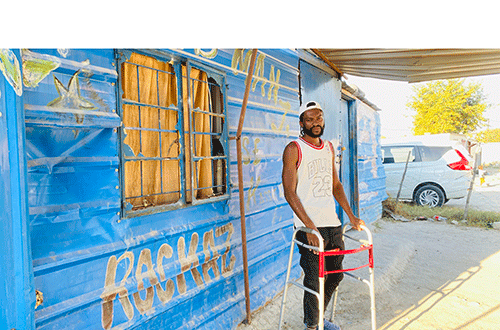Auleria Wakudumo
Oshakati – Omulumenhu weedula 31 e na oulema, omukalimo womEvululuko mOshakati ota ti onghalamwenyo yaye oi li moshiponga molwaashi ha dengwa nokunyonauninwa omaliko aye komona weedula 21, a dalwa kumumwaina.
Jafet Ishidimbwa okwa hokolola nghene onduda yaye yokunangala yandonyaunwa nokutataulwa omakende nomamanya, oipeleki imwe tai kufwa ko nokuli ye ta tewa meumbo molwavati oulema waye.
Okwa ti okwa ponokelwa lwopotundi 09h45 youfiku Etitatu, pefimbo vati kwa li ta li ouvalelo, a ponokelwa komona nomamanya ndele ta hanauna po onduda yaye noku mu denga kolutu.
“Okwa denga mo omakende obashu yange aeshe. Okwa ndonyouna yoo oipeleki ihapu ndele imwe te i kufa ko. Konima omamanya okwa pita momuvelo ndele tau euluka fiyo hatu tameke okulwa naye,” Ishidimbwa ta ti.
Molwoulema waye, omonamati vati oha kufa po oitenda yaye yokweenda opo a shiive okulwifa noku mu longela keshe osho a hala. Ishidimwa okwa ti kashi fi oshikando shotete ta ningilwa omahepeko kumumwaina ile komona. Okwa ti paife otave mu te mo nokuli meumbo molwonghalo yaye.
Ishidimwa okwa holola kutya okwa hovela okuningilwa omahepeko okudja eshi a mona oshiponga shotuwa mo2020. Manga ina ya moshiponga shotuwa, Ishidimbwa okwa li ha shingi otaksi yaye mwene oyo a mona nayo oshiponga.
Okwa holola kutya okwa kala omweeti woufila nomaadi meumbo na ka li e na oudjuu namumwaina ile omona washa.
“Ondi udite mumwameme okwa lunduluka eshi ihandi dulu vali okunyangadala, ame ihandi eta mo sha vali meumbo,” Ishidimbwa ta ti.
Ishidimbwa okwa holola yo kutya okwa kufwa ongodi yaye ndele tava kufa ko oshimaliwa eshi sha li ko shi fike poN$2 800.
Okwa ti okwa kwashilipaleka ouyelele wa tya ngaha nombaanga yaye oyo ye mu shiivifila kutya oshimaliwa osha kufwa ko kulye nokwa patulula oshibofa.
Okwa weda po yoo kutya ita kondjele ponhele yovanhu ashike okwa li a pula a pewe omhito yokukala ponhele opo fiyo ta monenwa olukwalwa ko-MVA Fund.
Meenghundafana naKundana, mumwaina waIshidimbwa okwa holola kutya Ishidimbwa vati oshilema sha pota noha kala ta tuku ovanhu.
Okwa ti eshi a ningilwa oku shi shi ashike okwe shi ningilwa molwoupote waye. Mumwaina okwa weda po yoo kutya okwa hala Ishidimbwa a yela mo meumbo laye.
Onda hala ashike a fiya po onhele yange. Nghi na nee kutya okwa uka peni, shamha ashike a dja mo monhele yange opo tu he lidenge omitwe mumwe vali.
Mumwaina okwa ti okwa ninga nale onghendabala okuya kopolifi opo Ishidimbwa a dje po ponhele yaye ashike inashi pita shaashi MVA Fund oku li metifa loku mu kongela onhele.
-wakudumoauleria@gmail.com


